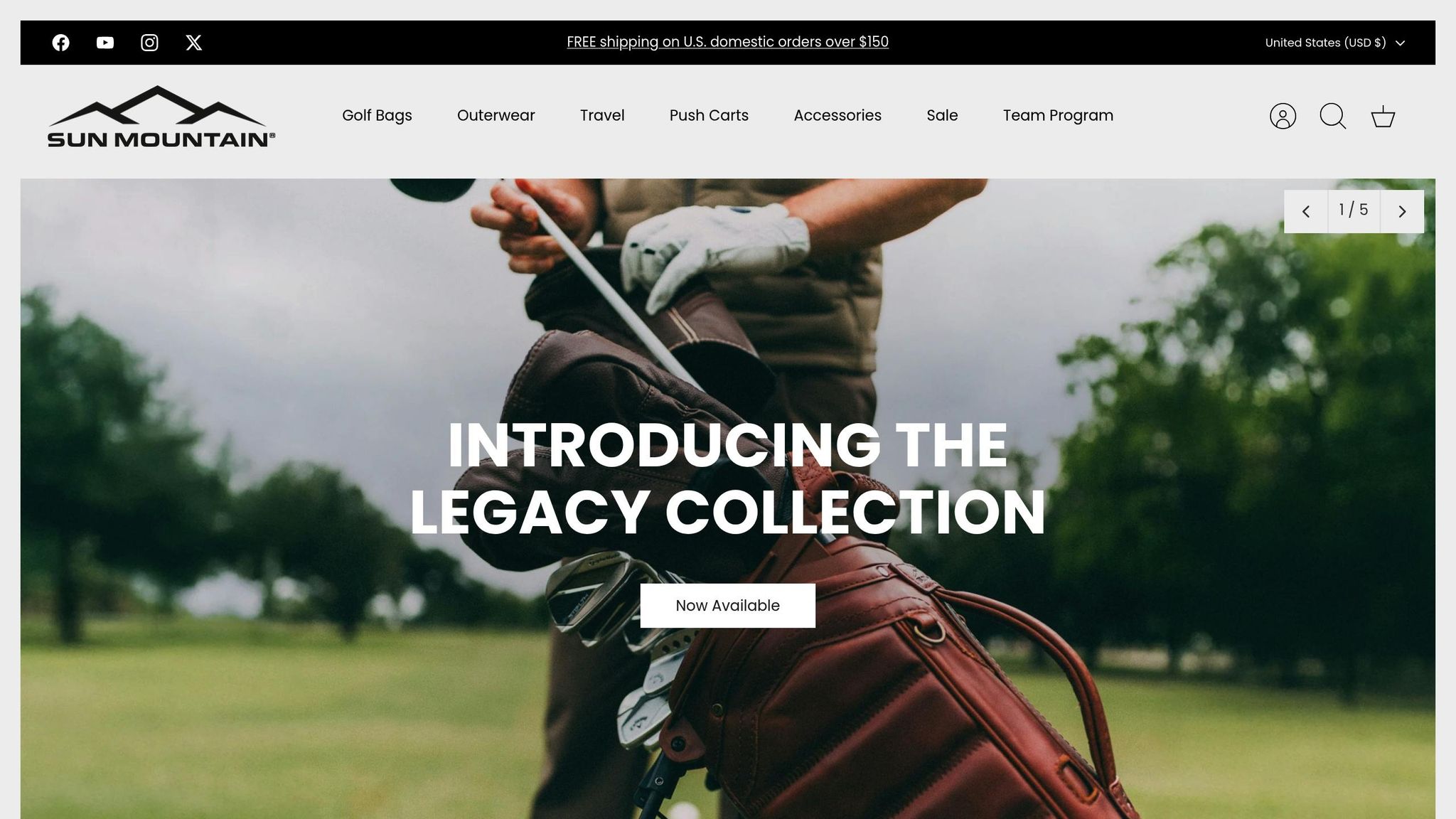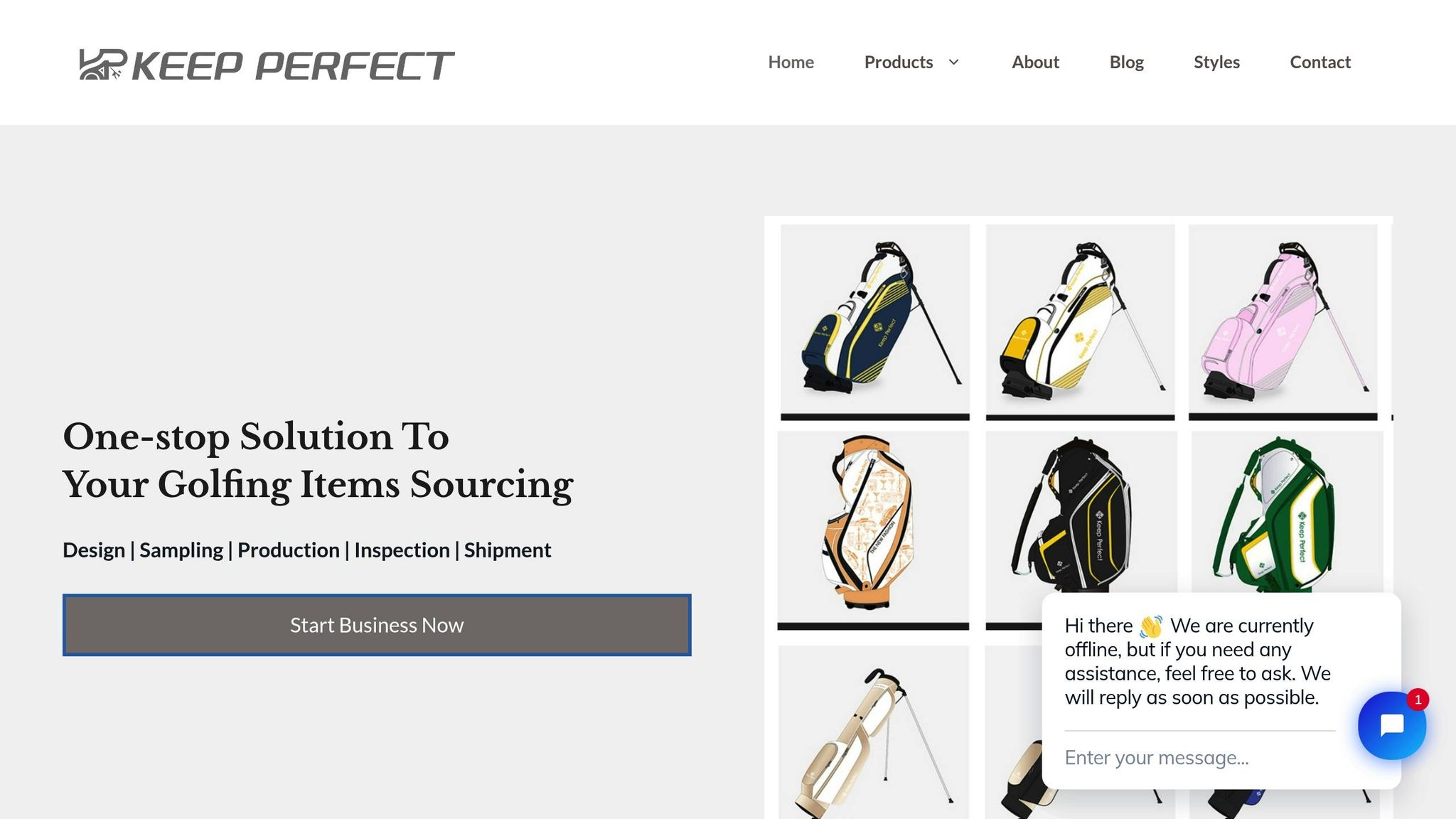Eco-friendly custom golf bags are transforming the golf industry. These bags use recycled materials like plastic bottles, energy-efficient production methods, and minimal packaging to reduce waste and carbon emissions. Here’s what you need to know:
- Materials: Recycled polyester, vegan leather, and biodegradable options like bamboo and organic cotton.
- Features: Modular designs, ergonomic straps, solar-powered chargers, and magnetic closures for durability.
- Customization: Logos, eco-friendly printing, and tailored compartments for reusable water bottles and scorecards.
- Impact: Brands like Sun Mountain, Keep Perfect Golf, and MNML Golf lead the way by repurposing up to 50 plastic bottles per bag.
- Production: Made-to-order models and zero-waste practices reduce environmental impact and overproduction.
For golf courses, investing in eco-friendly bags not only supports sustainability but also appeals to environmentally conscious players. Whether you prioritize customization or cutting-edge materials, these options offer a greener path for the sport.
Eco-Lite Golf Bag, Made With Recycled Plastic Bottles ♻️ By Sun Mountain Sports

Eco-Friendly Materials and Production Methods
The move toward making golf bags more eco-friendly centers on the use of recycled polyester, a material derived primarily from plastic bottles. By repurposing waste into durable golf gear, manufacturers are making strides in sustainability. A great example is the Wilson Staff Eco Stand Golf Bag, which incorporates over 50 recycled plastic water bottles into each bag. This approach not only uses less energy compared to traditional production methods but also helps cut CO₂ emissions.
Sun Mountain Sports has pushed this concept even further with their Eco-Lite golf bags, crafted from Repreve® fabric, a high-performance recycled fiber made from plastic bottles. Their efforts go beyond materials – part of the proceeds from Eco-Lite sales is donated to Montana River Action, an organization focused on river conservation. As they put it:
"We’re saving the planet, one golf bag at a time."
Manufacturers are also exploring biodegradable components to reduce long-term environmental impact. While recycled polyester remains the mainstay, there’s increasing interest in materials like organic cotton and bamboo fabrics for specific bag parts. These natural materials break down more easily at the end of their lifecycle, offering another layer of sustainability.
Energy-efficient production methods are another key focus. For instance, Jones’ R-series bags use recycled ripstop material made entirely from PET single-use plastic bottles. This fabric is not only durable and water-resistant but also requires less energy to produce, aligning with broader sustainability goals.
Reducing waste has become a priority in golf bag manufacturing. Companies are finding ways to minimize material waste during cutting and assembly, often repurposing leftover fabric for smaller components or accessories. This aligns with the growing trend toward zero-waste manufacturing, ensuring that every piece of material serves a purpose. These waste reduction efforts naturally extend to packaging innovations as well.
Packaging has seen its own eco-friendly transformation. Swannies Golf, for example, has teamed up with EcoEnclose to use 100% recycled and reusable packaging for all their products. This change can lower carbon emissions by as much as 40%, further contributing to sustainability efforts.
Consumer demand is a major driver of these changes. As Biodegradable Golf Canada Inc. explains:
"Golf manufacturers are always innovating, and the latest trend being driven by consumer demand is to make products more sustainable without impacting performance and quality."
Striking the right balance between environmental responsibility and performance is fueling advancements in materials science. Manufacturers are developing new recycled composites and biodegradable options that maintain – or even surpass – the durability and functionality of traditional materials.
Design and Customization Options
Eco-friendly golf bags are redefining durability and sustainability with modular designs that extend their lifespan while cutting down on waste. For instance, many now use replaceable magnetic closures instead of traditional zippers, sidestepping the common issue of zipper failures while keeping the sleek, polished look golfers love.
These modular designs are paired with ergonomic enhancements to improve comfort. Using lightweight recycled materials, these bags feature padded straps and balanced weight distribution, making them easier to carry across a full 18-hole course. This focus on ergonomics not only boosts user experience but also reduces the likelihood of early replacements.
To add even more functionality, features like solar-powered phone chargers and Bluetooth speakers can be incorporated without requiring golfers to replace their entire bag. By offering these optional add-ons, manufacturers help golfers upgrade their gear sustainably, avoiding unnecessary waste.
Keep Perfect Golf Gear takes customization to the next level, offering eco-conscious material options such as recycled polyester and vegan leather. Golf courses can align these choices with their sustainability goals, while the company’s comprehensive OEM/ODM services streamline everything from design to delivery. This makes it easier for courses to adopt environmentally responsible practices without added complexity.
Branding has also evolved to reflect eco-friendly values. Golf courses can now incorporate sustainability-focused graphics alongside their logos, using responsible printing methods like water-based inks and eco-dyes. These techniques reduce the use of harmful chemicals while delivering vibrant, high-quality designs.
A made-to-order production model further reduces waste by ensuring that only the required number of bags are produced. With flexible minimum order quantities – sometimes as low as 50 to 100 pieces per design – golf courses can avoid the pitfalls of overstocking while still meeting their needs.
Customization options extend beyond materials and branding. Golf bags can be personalized with hand-painted artwork, monogrammed initials, or unique patterns, proving that luxury and sustainability can go hand in hand. On the functional side, bags can be tailored with features like specialized pockets for recycled-paper scorecards, compartments for reusable water bottles, and dedicated spaces for eco-friendly tees and balls. These thoughtful designs not only enhance usability but also reinforce a strong commitment to sustainability.
Precision manufacturing techniques also play a role in minimizing waste. Processes like precision cutting and double-stitching improve durability by up to 20%, ensuring the bags last longer and reducing the need for frequent replacements. These advancements make it clear that eco-friendly golf bags can deliver both performance and environmental responsibility.
1. Keep Perfect Golf Gear

Eco-Friendly Materials
Keep Perfect Golf Gear prioritizes sustainability by using recycled polyester in their products. This material strikes a balance between being durable enough for frequent use on the golf course and reducing environmental impact. They also offer vegan leather alternatives, steering clear of traditional synthetic leather processes that release harmful volatile organic compounds.
Their material lineup includes ripstop fabric for added tear resistance and classic canvas options for a timeless aesthetic. These choices not only lower environmental impact but also meet the high-performance expectations of custom golf bags.
Design Features
The bags are built with a modular design that extends their lifespan and reduces waste. Thoughtful details like reinforced stitching, heavy-duty buckles, and compartments designed for reusable water bottles make these bags both durable and environmentally conscious.
Production Impact
To further reduce waste, Keep Perfect Golf Gear follows a made-to-order production model. Their integrated OEM/ODM services help streamline the journey from design to delivery, cutting down on unnecessary carbon emissions.
Customization Options
With more than 50 color and finish options, customers can personalize their golf bags to fit their style. Branding options include water-based ink printing and eco-friendly embroidery methods that avoid harmful chemicals. Practical add-ons like insulated cooler pockets, waterproof compartments, and padded shoulder straps enhance both functionality and comfort. Plus, bulk pricing ensures these sustainable, high-quality bags remain accessible.
sbb-itb-4fa7e8b
2. Other Green Custom Golf Bag Manufacturers
As sustainability becomes a priority in the golf industry, more manufacturers are stepping up to align their practices with the eco-friendly ethos of green golf courses. By rethinking materials, designs, and production methods, these companies are making strides toward a cleaner, greener future for the sport.
Eco-Friendly Materials
Minimal Golf has been working with SeaWasteX since 2019 to tackle ocean pollution. Together, they recover discarded nylon objects and fishing nets from beaches and oceans, transforming this waste into durable nylon pellets. These pellets are then used to craft the fabrics for their golf bags. As founder Sam Goulden aptly puts it:
"For the player. For the planet."
Rovestar has adopted a different approach by using 50% recycled materials in their golf bags. They’ve also launched a take-back program across Canada and the United States, allowing customers to return old bags for component reuse and recycling of leftover parts.
These efforts mark a clear departure from traditional golf bags, which often rely on less sustainable materials like conventional nylon, polyester, and non-eco-friendly PU.
Design Features
Eco-friendly golf bag designs are now focusing on durability and functionality. Features like magnetic closures are being introduced to extend the lifespan of bags while minimizing waste. Some manufacturers are also integrating smart technologies, such as solar-powered phone chargers and GPS compartments, combining convenience with sustainability.
Personalized golf bags are another way to promote sustainability. Custom designs are often treasured and maintained for longer periods. Lightweight materials like carbon fiber are also becoming popular, offering ease of use without sacrificing durability. In 2024, Titleist joined the movement by launching a sustainable golf bag collection, showcasing how major brands are embracing environmentally conscious trends.
These thoughtful designs not only enhance the user experience but also help reduce the overall environmental impact of production.
Production Impact
The manufacturing process for golf equipment has historically had a significant environmental footprint. However, many companies are now adopting greener practices. For instance, switching to eco-friendly packaging has helped some manufacturers cut carbon emissions by as much as 40%. Additionally, many are investing in energy-efficient processes and renewable energy sources like solar panels and wind turbines to power their facilities.
As Biodegradable Golf Canada Inc. observes:
"Golf manufacturers are always innovating, and the latest trend being driven by consumer demand is to make products more sustainable without impacting performance and quality."
Customization Options
Sustainability and customization increasingly go hand in hand. Recycled polyester and biodegradable materials are opening up new possibilities for personalized designs. Manufacturers are also turning to biodegradable cellulose fibers and other recycled materials to create unique, eco-conscious products.
Samuel Goulden of MNML Golf captures the spirit of this movement:
"The game is evolving – let’s make sure it moves in the right direction."
These efforts reflect a broader shift among manufacturers toward creating golf bags that not only match personal style but also align with the environmental values of today’s golfers. By combining innovation with responsibility, these companies are helping to ensure that the sport evolves in a way that benefits both players and the planet.
Pros and Cons
When choosing eco-friendly custom golf bags for green golf courses, it’s essential to weigh the strengths and limitations of different manufacturers. Here’s a side-by-side look at key factors:
| Aspect | Keep Perfect Golf | Other Green Manufacturers |
|---|---|---|
| Material Options | Offers a variety of materials, including recycled polyester, vegan leather, canvas, and TPU (up to 95% recyclable) | Utilizes recycled materials like ocean plastic |
| Customization Flexibility | Extensive options for logos, materials, and patterns; uses eco-friendly printing methods | Primarily focuses on sustainable materials, limiting customization options |
| Production Control | Direct production ensures consistent quality and global reliability | Production methods can vary, leading to potential inconsistencies |
| Cost Considerations | Competitive pricing through direct manufacturing; TPU options range from $2–$8 per unit compared to PVC at $1–$5 | Higher costs due to advanced sustainable materials |
| Durability Performance | TPU materials endure over 100,000 flexes and last 3–5 years outdoors | Durability depends on the specific materials used |
Keep Perfect Golf stands out for its balance of branding flexibility, cost-effectiveness, and reliable production while maintaining eco-conscious standards. On the other hand, other green manufacturers often lead the way in pioneering new sustainable materials and eco-friendly production methods, though this focus may come with higher costs and fewer customization options.
For golf courses prioritizing branding alongside environmental responsibility, Keep Perfect Golf’s approach offers a well-rounded solution. Meanwhile, courses aiming for cutting-edge sustainability may find manufacturers specializing in innovative materials a better fit. Both paths contribute to greener golf while addressing different needs for durability, cost, and environmental impact.
Conclusion
Sustainable golf accessories are no longer just a nice-to-have – they’re essential for eco-conscious golf courses. Custom golf bags made from recycled materials offer a way to align course operations with environmental values while maintaining top-tier performance.
Materials like recycled polyester, vegan leather, and innovations such as Repreve® provide durability without straying from green goals. Take the MNML Golf MR2 Sustainable Golf Bag, for example – it repurposes 40 plastic bottles per bag. As MNML Golf puts it:
We’re protecting the planet, one golf bag at a time.
For courses that want to balance eco-friendliness with customization, Keep Perfect Golf is a standout choice. They offer eco-conscious materials, advanced printing techniques, and a variety of branding options – all at competitive prices.
For those looking to push the boundaries of sustainability, partnering with manufacturers who specialize in recycled materials is key. These companies often transform waste like plastics into durable, high-performance bags. While premium sustainable options may come with a higher price tag, the environmental benefits they bring are well worth the investment.
Here are some recommendations for courses aiming to make eco-friendly decisions:
- Work with manufacturers that have clear, measurable environmental initiatives.
- Focus on durability features like magnetic closures and reinforced stitching to extend product life.
- Choose eco-friendly customization methods, such as water-based inks and biodegradable packaging.
Investing in sustainable custom golf bags offers more than just environmental perks – it’s a strategic move for the future. As golfers become more environmentally aware, courses that genuinely commit to green practices can foster stronger brand loyalty and attract like-minded players. By blending eco-friendly designs with personalized branding, courses can boost both their sustainability efforts and market appeal. Whether you’re opting for tried-and-true sustainable designs or exploring cutting-edge materials, both paths lead to greener, more responsible golf operations.
FAQs
What are the environmental advantages of using recycled materials in custom golf bags?
Using recycled materials in custom golf bags offers several environmental perks that make a real difference:
- Cuts Down on Waste: By transforming items like plastic bottles into golf bags, less trash ends up in landfills or contaminating our oceans.
- Reduces Carbon Footprint: Manufacturing with recycled materials typically uses less energy than producing brand-new ones, which means fewer greenhouse gases are released into the atmosphere.
- Preserves Natural Resources: Relying on recycled materials lowers the demand for extracting fresh raw materials, promoting a more resource-efficient and sustainable system.
These eco-conscious choices not only align with the values of environmentally friendly golf courses but also pave the way for a greener future – all without sacrificing quality or performance.
How do eco-friendly golf bags with modular designs enhance durability and sustainability?
Eco-friendly golf bags with modular designs bring together sustainability and practicality in a way that benefits both golfers and the planet. The modular approach means that individual parts – like straps or pockets – can be easily repaired or replaced. This not only extends the life of the bag but also cuts down on waste. On top of that, many of these bags use materials like recycled fabrics or biodegradable components, reducing their overall environmental footprint.
For golf courses, investing in these modular, eco-conscious bags is a smart way to support sustainability efforts. At the same time, they provide players with durable, reliable gear that doesn’t compromise on performance.
What are the customization options for eco-friendly golf bags that support a course’s sustainability goals and branding?
Eco-friendly golf bags offer a variety of customization options that cater to both sustainability goals and branding needs. One major aspect is the choice of materials – options like recycled polyester, organic cotton, or fabrics made from repurposed plastic bottles are not only durable but also help minimize environmental impact.
Another way to personalize these bags is through design and color choices, allowing golf courses or brands to showcase their unique identity with specific color palettes, patterns, or custom prints. On top of that, logo and artwork customization lets you add personal touches, such as course logos, golfer initials, or custom graphics, ensuring the bags stand out while reinforcing brand visibility.
These features not only make the bags visually appealing but also send a clear message about a commitment to environmentally conscious practices.

